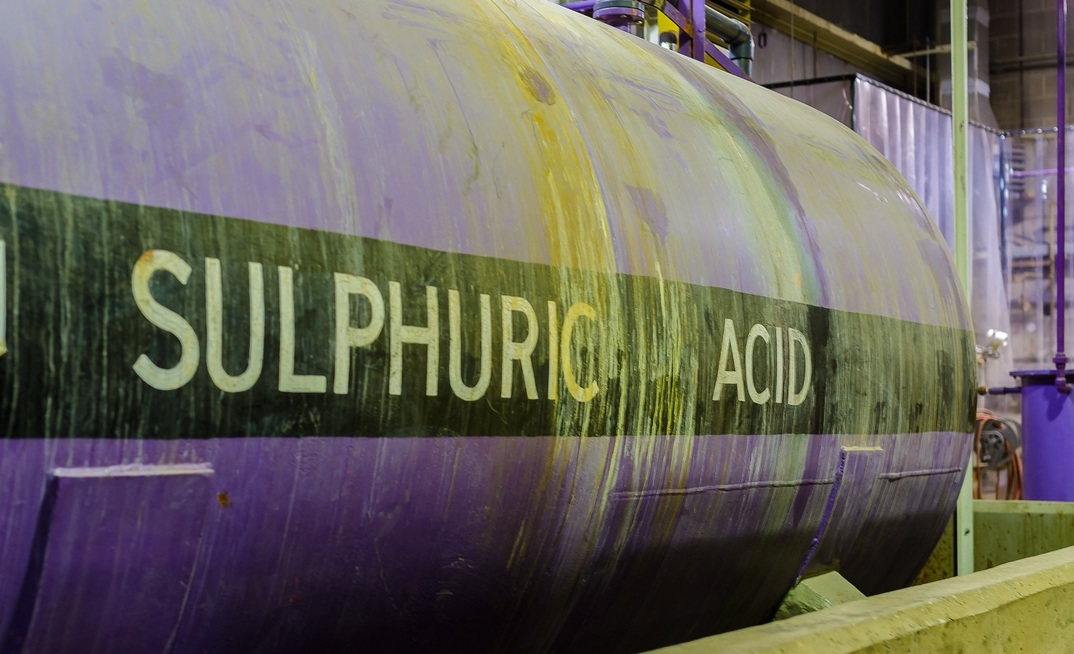Korea Zinc is unable to export sulphuric acid from its Seokpo refinery to its Onsan zinc smelter following a suspension order.
"The Nakdong River Basin Environmental Office, under the Ministry of Environment, has reportedly issued an administrative order to Korea Zinc's Onsan smelter at the end of December last year."
The order, citing a violation of Article 27 of the Chemical Substances Control Act, stated that Korea Zinc's Onsan smelter is prohibited from storing sulfuric acid gas brought in from third parties, Korea Zinc confirmed.
The smelter is located in Onsan City and has two production lines, one with Mitsubishi technology and the other with Flash technology. The total capacity of the smelter is 1.9Mtpa of zinc concentrate.
The suspension is linked to the management dispute between Korea Zinc, Young Poong, and MBK, and the government's administrative disposition.
Sulphuric acid dispute
South Korea exports its sulphuric acid to Europe, North Africa and South America. It is a key trade partner in the global supply of sulphuric acid, which is used during the smelting process and in the production of fertilisers.
The dispute concerns the shortage of Young Poong's sulphuric acid processing facilities, which has meant that, in the past, the company has delegated the processing of half of its annual sulphuric acid output of 750,000t to Korea Zinc via the Onsan railway and exported it through Onsan Port.
This, Korea Zinc said, "has long been a cause of tension between the two companies, with Korea Zinc stating that it no longer had the capacity to accept sulphuric acid deliveries at the Onsan smelter due to increased production, nor could it continue to manage the risks associated with the transport and management of these hazardous materials".
According to Korea Zinc, Young Poong has strongly opposed this decision, arguing that it currently has no alternative means of processing the sulphuric acid.
Ultimately, the environmental authorities' ruling prohibiting this seems to have finally brought this conflict to a close.
Global market
Analysts see the sulphuric acid market as being short into the start of this year, with European output down and curtailments out of Japan also.
Any shortness in supply will be passed onto copper smelters, who use sulphuric acid in the smelting process, and mine owners, who use sulphuric acid in the leaching and processing of base metals ore.
Freda Gordon, director of Acuity Commodities, posted on social media this week about the sulphuric acid shortage, pointing to shortages coming out of Japan.
"The planned shutdown of Toho Zinc's smelter in Japan highlights the ongoing squeeze in zinc concentrate supplies, which is also affecting sulphuric acid availability," Gordon said.
"While the shutdown is set for the end of the financial year 2024, the exact timeline remains unclear. The smelter produces around 150,000tpa of sulphuric acid, depending on operating rates, and its closure will reduce Japan's acid supply."
South Korea and Japan operate as one benchmark.
Twists and turns
This is the latest in a series of twists and turns for the company after MBK teamed up with Young Poong Corp., Korea Zinc's largest shareholder, to launch a hostile takeover bid.
Korea Zinc has the largest zinc smelter in the world.
This came as two branches of the metal producer's founding family were locked in a dispute over the management of the business, which was founded more than 50 years ago.
The deal is also attracting political opposition. In September 2024, Young Poong launched a $1.7 billion takeover bid, along with private equity firm MBK, for up to 14.6% of Korea Zinc shares.
The bid was raised over corporate governance concerns.
Young Poong is made up of members of the Chang family. Chang Byung-hee was one of the original founders of Korea Zinc, along with Choi Ki-ho.
The shareholder dissent led to chairman Choi not only publicly apologising for a rushed IPO but also committing to fortifying board independence, enhancing corporate governance and increasing protection and engagement for minority shareholders.


























